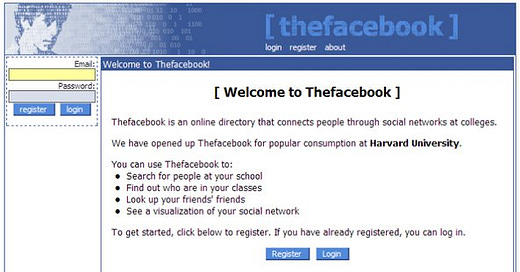The Social Network
When Facebook first formed, it was only open to the elite of Harvard.
This created an aura of “cool” that enticed other college students to be part of this network.
From there it grew and grew on campuses across the country.
But why did Facebook first achieve network effects?
When thefacebook.com launched, its homepage stated it served to allow students to:
Search for people at your school
Find out who are in your classes
Look up your friends’s friends
See a visualization of your social network
An early Facebook employee pointed out, “Notice that dating, flirting, hooking up is not mentioned at all. It cannot be. That makes it predatory or loserish, that makes it OK Stupid.”
Facebook effectively popularized voyeurism and made it acceptable.
Now you could see if the girl in your Spanish class was single, and also check out pictures of her on spring break.
In the 2010 film, The Social Network, Mark Zuckerberg, played by Jesse Eisenberg had an aha moment right before launching the first version of Facebook:
Adding “’Relationship Status,’ (e.g. single) and ‘Interested In’ (e.g. women) to the profile page.
Eisenberg says, “This is what drives life at college. Are you having sex or aren’t you. It’s why people take certain classes, and sit where they sit, and do what they do, and at its, um, center, you know, that’s what theFacebook is gonna be about. People are gonna log on because after all the cake and watermelon there’s a chance they’re actually gonna…”
To which Co-founder Eduardo Saverin interrupts, “Get laid.”
While this social network was first organized around personal relationships, other sites like TikTock are organized around interests and have become more open.
Today, anyone can have a mouthpiece and also be a voyeur of anyone in the world.
Now that’s meta!



